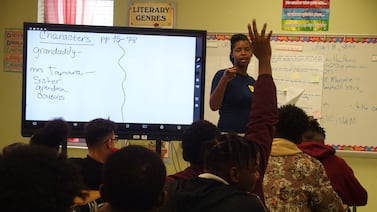Sign up for Chalkbeat New York’s free daily newsletter to keep up with NYC’s public schools.
New York students will no longer be required to pass Regents exams to earn a diploma beginning in the 2027-28 school year, according to a proposed timeline state officials unveiled Monday.
That means current ninth graders may not need to pass the exams to graduate — though students will continue to take them — a shift with significant implications for teaching and learning across New York.
State education officials have been rethinking what it should take to earn a high school diploma in recent years, sketching out a new “portrait of a graduate” that reflects seven areas over which students must show proficiency. Students are expected to have new ways to demonstrate command of those areas, including internships, capstone projects, and community service.
A major part of the overhaul is reducing the role of Regents exams — standardized tests in English, Math, science, and social studies — that high school students must typically pass to graduate. New York is one of a dwindling number of states that use such exams. Research suggests they do little to promote student achievement or raise their earning potential and can lead to higher dropout rates.
Many educators and advocates have cheered the state’s plans to reduce the influence of Regents exams, arguing that they do not adequately assess student’s skills or knowledge, force teachers to focus on memorization, and present unnecessary hurdles for students with disabilities and English learners.
Yet others worry making the exams optional raises the risk that some students, particularly those with greater needs, will be funneled into less rigorous pathways with lower expectations.
State Education Commissioner Betty Rosa acknowledged during Monday’s Board of Regents meeting that the shifts are likely to be contentious.
“We’re going to have some cases where we agree to disagree respectfully,” she said. Still, “we are so excited about the fact that we are moving forward to ensure that our schools really prepare our students for the very, very best.”
Officials sketched out a timeline on Monday for overhauling graduation standards, a process they indicated will take at least five more years. Though the plans are subject to approval from the Board of Regents, here are some of the key dates that students, educators, and parents should keep in mind.
Later this school year: The ‘portrait of a graduate’ emerges
To graduate from high school under the new standards, New York students will have to demonstrate proficiency in seven key areas: critical thinking, effective communication, cultural and social-emotional competences, innovative problem solving, literacy across content areas, and status as a “global citizen.”
Officials are still in the process of defining each of those areas and translating them into explicit credit requirements students must meet. Those definitions are expected to be released sometime this school year, though full details of the new credit requirements won’t be unveiled until the 2025-26 school year.
In one tweak for students taking Regents exams later this school year, state officials are proposing exemptions for students who experience “major life events,” a recommendation from a Blue Ribbon Commission that has helped shape the new graduation measures. (Details about how students qualify are still being worked out.)
Officials said the next year will mostly be about digesting and refining the new graduation standards.
“It’s a year of: Consume it, and then start to think about it,” Rosa said.
Fall 2026: New coursework in financial literacy and climate education
Schools across the state will face new mandates to teach students about financial literacy and the climate. However, that content will not be part of the new graduation requirements, according to Santosha Oliver, an assistant commissioner for the state Education Department’s office of standards and instruction.
“While additional information is forthcoming, we plan to articulate broad topics for required instruction with flexibility in implementation,” Oliver said.
Fall 2027: Regents exams no longer required — and big changes begin to roll out
Beginning in the 2027-28 school year, students will no longer be required to pass Regents exams to graduate high school. Due to federal rules, students will continue taking Regents exams in Math, English, and science, but they will not be required to earn passing scores to get a diploma. (Officials said they are still considering whether to require a social studies test, which is not required by federal law.)
Ninth graders who begin high school in the fall of 2027 will be the first cohort required to meet the state’s overhauled credit requirements, though officials have not yet outlined them. At the same time, the state will move toward a single diploma with opportunities to earn special seals and endorsements, such as for civics, biliteracy, or excelling on the Regents exams.
Schools should also begin to offer new graduation pathways during the 2027-28 school year, which can include capstone projects, community service, work-based learning experiences, and more, state officials said.
Fall 2029: All systems go
Officials expect that for students entering high school in the 2029-30 school year, the new graduation measures will be fully phased in — about a decade after the state began the latest process of overhauling graduation standards.
That means students will have to meet the state’s new credit requirements and demonstrate proficiency in the seven areas outlined in the “portrait of a graduate” with a range of new methods for demonstrating competence in those areas.
Still, state officials stressed that the timelines are subject to change, as the Education Department continues engaging communities and gathering feedback.
“None of this will happen in isolation with just the department behind closed doors,” Angelique Johnson-Dingle, deputy commissioner of P-12 instructional support, told Chalkbeat. “While we have painted some very clear dates … we know that life sometimes happens.”
Ongoing: Lots of questions remain
Several members of the Board of Regents raised questions about how the changes will reshape instruction, whether schools will have the resources they need to comply with new requirements, and if the changes could result in widely different types of education for different students — raising equity concerns.
Regent Patrick Mannion, of Onondaga and who represents several other upstate counties, noted that while career and technical education has grown in popularity, districts may not be able to quickly create enough internships or project-based learning opportunities for students who may want them, even as they may count toward the state’s revamped graduation requirements.
“I don’t think I’d be ready for doing that on a scale that is … frankly unimaginable to most of us,” Mannion said.
Even supporters of reducing the weight of Regents exams have cautioned that alternative models can be difficult to spin up. State officials have long granted exemptions to most of the Regents exams at 38 schools across the state, all but two of which are in New York City, with educators offering project-based assessments in their place. Some supporters caution that the model requires careful planning and buy-in from educators who believe in the approach.
Regent Roger Tilles, of Nassau county, wondered how teachers might adapt to a new slate of expectations about what students must learn. “It’s not going to be easy,” he said. “We’re not going to be able to do this without teaching civics education and information literacy at lower grades.”
Others raised questions about whether there is sufficient funding for the rollout.
The state Education Department plans to spend about $11.5 million for staff and other support within the department over the next five years to develop and roll out the new graduation measures. And officials acknowledged local districts and schools may need more funding in their budgets to adapt to the new requirements.
“There’s no way to do this kind of work without adding on additional funding that we do have to advocate for,” Rosa said.
Alex Zimmerman is a reporter for Chalkbeat New York, covering NYC public schools. Contact Alex at azimmerman@chalkbeat.org.





